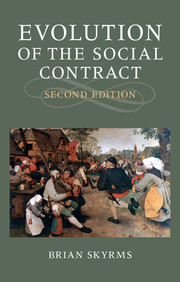Postscript
Published online by Cambridge University Press: 05 November 2014
Summary
THE preceding five chapters do not attempt to present a full theory of the evolution of the social contract. Rather, they are an introduction to some of the elements of such a theory. From one perspective, the elements may be seen as a list of simple models of general problem areas: bargaining games and distributive justice, ultimatum games and commitment, Prisoner’s Dilemma and mutual aid, hawk–dove and the origin of ownership, and signaling games and the evolution of meaning.
But from another point of view, the elements of the theory are the basic conceptual tools that have been introduced along the way. In the first chapter, we met the basic concepts of Nash equilibrium and Evolutionarily stable strategy, and the replicator dynamics that stands behind the concept of evolutionary equilibrium. We saw how one could explore the effect of various factors on the size of basins of attraction of equilibrium states of the population. In Chapter 2, we saw the tension possible between commitment and sequential rationality. Here classical game theory and the theory of evolution begin to diverge. When we apply the replicator dynamics to the symmetrized ultimatum game, we find it does not eliminate strategies that fail the test of sequential rationality. This remains true even when we introduce the “trembling hand” into our evolutionary models by adding mutation and recombination to the replicator dynamics. In Chapters 3 and 4, we met two rather different kinds of correlated equilibria. In evolutionary game theory, there are two different kinds of (uncorrelated) mixed equilibria: one where individuals play randomized strategies and another where the randomness comes from random pairing in a polymorphic population. Generalization of the first kind of mixed equilibrium to the correlated case gives the Aumann correlated equilibrium of Chapter 4, which plays such a central role in convention formation by symmetry breaking. Generalization of the second kind of mixed equilibrium to non-random pairing gives the entirely different correlated evolutionary game theory developed in Chapter 3, which stands behind all accounts of the evolution of altruism.
- Type
- Chapter
- Information
- Evolution of the Social Contract , pp. 106 - 110Publisher: Cambridge University PressPrint publication year: 2014



